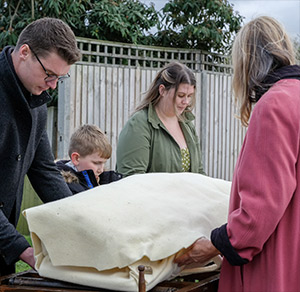A Deeper Understanding
A Jewish funeral is noted for simplicity, humility, and solemnity. Jewish funerary practices are a balancing act of facing the reality of death in the context of a tradition that offers a pathway designed to provide both solace and an opportunity to grieve. A funeral reminds us of the tenuous yet holy nature of life.
Introduction
A funeral may consist of prayers (including the 23rd Psalm, El Malei Rachamim) and hespedim (eulogies). It may also include words of comfort, poetry, music, personal readings and stories, singing, fond reminiscences, combined with the resultant expression of a variety of emotions. It is common at a Jewish funeral for those in attendance to speak directly to the deceased. This can elevate the experience to an even more intimate and meaningful level.
A funeral may take place at the graveside. Or there may be a service at one location such as a synagogue or funeral home chapel, followed by a more intimate service at the graveside.
Details
The Hebrew word for funeral is levayah, which literally means “accompanying,” and is the essence of the mitzvah of the funeral. A related expression often used is l’vayat hameit, accompanying of the deceased.
At a funeral, the community provides nichum aveilim, comfort to the mourners by being present and supportive. Those close to the deceased or the family are there to witness the loss and their presence is a huge act of kindness for all involved. The rabbi, or others acting as clergy or officiant, balance traditional practices with the requests of the mourning family. At a Jewish funeral, the casket remains closed. It is considered disrespectful to look upon someone who cannot look back at us.
A Jewish funeral is an opportunity to face the reality of death. It acknowledges the reality of death and in so doing forces the grieving process to begin. Those who accompany the dead and those who provide comfort to the mourners are offering unconditional kindness in a time of need.
It is the Jewish custom to bury our dead as soon as possible. We do this to assist the soul which awaits burial before beginning to ascend into the “Heavenly Realms.” According to the kabbalists the soul is anxious to move on but stays close to its body until burial.
Resources to Learn More
- Chabad: The Basics of a Jewish Funeral
- BimBam video: A Jewish Funeral
A funeral is an opportunity to gather with and support the mourners, honor the person who has died, begin the communal process of saying goodbye, and commence the transition from how things were towards how they are to be. A funeral is a communal event that includes prayers, eulogies, and sharing as a way to remember and often celebrate the person who has died and to provide comfort to those still alive.
Click on icons below to learn about this topic from different perspectives.
Practical
Emotional
Textual
Spiritual
The Funeral from the Practical / Physical Perspective
The funeral is a communal opportunity to honor the deceased and comfort their family and friends. The location and order of the funeral service varies based on the community, the wishes of the deceased, and the practical and emotional needs of the mourners. At the funeral the casket remains closed, as it is considered disrespectful to stare at those who are vulnerable.
The Funeral from the Emotional / Feelings Perspective
Attendance by the community at a funeral provides emotional support for the mourners and is thought by the kabbalists to give comfort to the departing soul of the deceased. The funeral is an opportunity to begin the process of mourning and allow the mourners to face the reality of their loss in very tangible ways. Being at the graveside and acknowledging the reality of the death is helpful in the grieving process, allowing mourners to show their feelings openly.
The Funeral from the Intellectual / Textual Perspective
The common elements in a Jewish funeral are: kriah, hesped (often more than one remembering the life of the deceased), the 23rd Psalm (the Lord is my shepherd), and El Malei Rachamim. Other readings may be included to honor the deceased. The importance of speedy burial is taken from Deuteronomy 21:23, which says that even if a criminal is impaled in public, he should be buried the same day.
The Funeral from the Spiritual / Soul Perspective
We are all mortal and one day we will die. A funeral brings us face to face with this reality. The funeral is an opportunity to confront death, surrounded with loving and supportive family and friends. The Kabbalah teaches that the soul of the deceased is present at the grave and that some aspects of the soul will continue to connect there. Burying the dead with the accompanying prayers and eulogies is thought by the kabbalists to be a source of great comfort to the disembodied soul.


